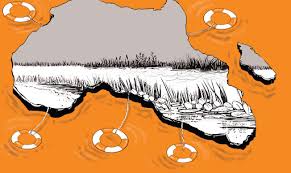

The ongoing political instability in the Goma region of the Democratic Republic of Congo has highlighted Africa’s persistent struggles.
Recently, Mozambique was shaken by political turmoil following its October disputed elections, the Sudan war has led to the largest forced displacement crisis in the world, Somalia has faced numerous internal security challenges for a long time, and Kenya has been criticised over many forced disappearances.
Additionally, recent tensions between countries such as Ethiopia and Somalia, and Rwanda and the DRC paint a picture of some of the challenges afflicting the continent.
Besides these, devastations orchestrated by the impacts of climate change have been on a sharp rise, with reports from global institutions such as the World Meteorological Organization indicating that Africa is experiencing extreme climate events such as droughts, heatwaves and floods.
These climate issues will lead to a strain on the already meagre resources of the continent. They are already destroying lives and livelihoods in many parts of the continent, increasing malnutrition levels, hunger, forced migrations and conflicts.
US President Donald Trump’s move stop USAID operations has sparked significant concern among many African governments, which have long relied on foreign aid to sustain critical sectors such as health and education.
More than six decades after gaining independence, one might expect African nations to have created mechanisms of being self-sufficient in the face of global challenges.
However, some still depend on their former colonial rulers for support, while others have become deeply indebted to developed nations.
In her book Dead Aid, Dambisa Moyo argues that despite receiving trillions of dollars in aid since independence, Africa has yet to achieve self-sufficiency.
These funds could have been used to transform key economic sectors and reshape the continent’s future. However, much of the aid has been mismanaged, embezzled and concentrated in the hands of a few individuals.
So then, what would happen if, indeed, aid is stopped for, say, one, two or five years? And what would be the aftermath in Africa if there were no checks on extrajudicial killings? Who will protect the citizens of these mineral-rich countries?
Well, perhaps Dr. Kwame Nkrumah puts it best: “The problem of Africa is fundamentally a problem of governance.”
Africans tend to choose the worst among them as leaders, only to lament the duration of their time in office before returning to select them or their allies again.
This cycle has made it challenging to eliminate corruption and the misuse of public funds.
Despite these challenges, most far-looking leaders continue to steer their countries into the promised land.
Africa is indeed the richest continent in the world. But its woes are pushing it back into what it was once called by critics ‘The Dark Continent’.
To ensure that it does not sink further into these troubles, there is an urgent need to transform governance and political ideologies.
Africans must say no to mediocrity, theft and corruption. They must rise with one voice and fight against injustice.
No one will save Africa, except Africans themselves. Africans must decide now!
MORRIS MAKABE, Communication specialist



